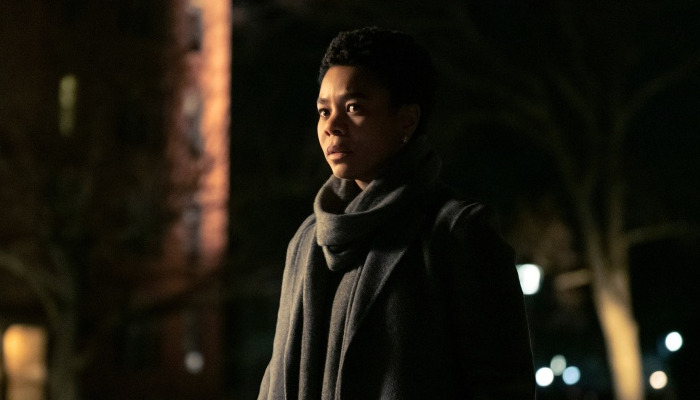Master Review
Master (2022) Film Review from the 44th Annual Sundance Film Festival, a movie directed by Mariama Diallo and starring Regina Hall, Zoe Renee, Julia Nightingale, Talia Ryder, Ella Hunt, Noa Fisher, Anna Van Patten, D.C. Anderson, Angela Grovey, Will Hochman, John Kroft, Amber Gray, Bruce Altman, Talia Balsam, Kara Young, Emmett Carnahan, Megan Byrne and Orlagh Cassidy. Director Mariama Diallo’s new film Master is destined to be the most controversial film set on a college campus since John Singleton’s Higher Learning from way back in 1995. Diallo’s film is, unlike Singleton’s, a true horror picture and it showcases three fine performances from its central female cast with Regina Hall emerging with the best turn of the three. Diallo’s picture is tense and disturbing and although it does go places that aren’t thematically satisfying, it makes the audience question race relations in thought-provoking ways that make it comparable to another fairly recent horror film, Get Out.
Advertisement
Master is set at Ancaster College in New England where the institution’s cutthroat mentality is physically and emotionally tolling on both its student body and the faculty. A freshman named Jasmine (Zoe Renee) is struggling to stay afloat as the film’s main premise kicks into gear. If stories about a dead witch that haunts the campus wasn’t enough, one of Jasmine’s professors, Liv Beckman (Amber Gray in a star-making turn), is about to flunk Jasmine for her latest literature paper. Herein lies the film’s conflict. Beckman is applying for tenure at the prestigious college and when she gives Jasmine a poor critique of her paper, Jasmine challenges the teacher and goes above her head to do so. What ensues is interesting and compelling as Jasmine goes through a sort of hell-like experience at the school whether it be at a party or dealing with the unfair professor’s mark. Jasmine doesn’t fit in whether it be in her awkward interaction with her roommate (Talia Ryder) or with a young man who cheats on his girlfriend by kissing Jasmine insincerely at the aforementioned party. This film’s main character, though, becomes Gail Bishop (Regina Hall), a newly appointed “master” She is the first black woman to receive this title and is proud and determined when we first meet her. That will all change as the events of the film unfold. There is a plot twist in Master which bothered me but not enough to keep me from enjoying the movie. This twist revolves around the character of Professor Beckman. We’re never quite sure of this character’s “true” identity or her motives even when the film reaches its disturbing ending, and this remains a problem with the film which holds it back from achieving greatness. Gray’s performance is certainly unnerving and intriguing throughout. Watch when she puts on “black” music at a party to display her race’s culture to the mostly white crowd. Gray is fantastic in this scene as Gail has learned a secret that could or could not be true that will change both of their lives forever. Hall runs away with the film and may well emerge as one of this year’s Sundance Film Festival’s acting queens. She had two films at Sundance that I was able to view, and in both films, Hall is tough, fierce and goes for broke. In Master, especially. This horror film comes to life at the end as Hall has had enough and doesn’t keep quiet about it. She delivers a speech that will captivate the audience and stir up thoughts about the topics she discusses. Unfortunately, the movie ends shortly after this dialogue which is just as the film started to get great. Master is, first and foremost, a horror film and on that count, it succeeds. As it explores the criticism of subjective topics such as through the paper Jasmine writes for the professor, the film unveils complex, deep topics that make the audience ponder just what is true and what is simply an opinion. Even the tale of the haunted college is explored. Is the college haunted or is it haunted because Jasmine is told that it is? There are some fascinating answers that the film provides for the viewer. However, Hall’s work is the reason to see Master. She is so relatable and, in her last big speech, so (disturbingly) accurate that one can’t help but leave the film with an uneasy feeling that will make the viewer afraid. Not of the witch that supposedly haunts the college but of the system that our ancestors left behind regarding the supposed necessity of a college education. Subjectively, the campus in the film may be haunted if one thinks it is but, objectively, it’s all in one’s perception of the stories told about the past. At the same time, objectively, the whole system in the film seems flawed with poor grades given to good students equated with a professor receiving tenure. And, objectively, the ability for the viewer to understand the hell world of an undergraduate liberal arts college education is Master‘s greatest accomplishment. This is a powerful movie. Rating: 8/10 Leave your thoughts on this Master review and the film below in the comments section. Readers seeking to support this type of content can visit our Patreon Page and become one of FilmBook’s patrons. Readers seeking more Sundance Film Festival news can visit our Sundance Film Festival Page, our Film Festival Page, and our Film Festival Facebook Page. Readers seeking more film reviews can visit our Movie Review Page, our Movie Review Twitter Page, and our Movie Review Facebook Page. Want up-to-the-minute notifications? FilmBook staff members publish articles by Email, Twitter, Facebook, Instagram, Tumblr, Pinterest, Reddit, and Flipboard.
